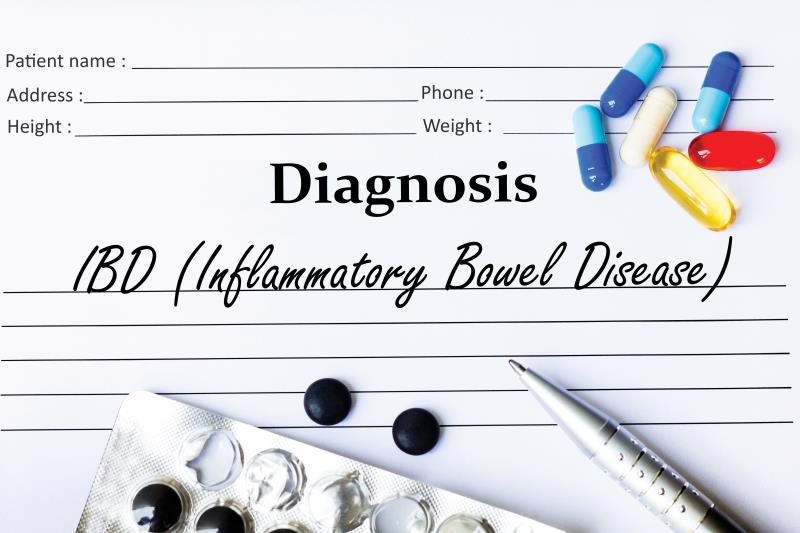Biologic–immunomodulator combo of no benefit in inflammatory bowel disease





In the treatment of patients with Crohn’s disease (CD) or ulcerative colitis (UC), adding an immunomodulator to ustekinumab or vedolizumab has a null effect on key outcomes, including clinical remission or response, endoscopic remission, and persistence of therapy at 1 year, as shown in a study.
These findings suggest that “routine use of such a strategy in all patients may not be warranted,” the investigators said.
Combining an immunomodulator with biologic drugs is done to address a loss of response that occur at a rate of 10–25 percent annually, which may be attributed to antidrug antibodies causing suboptimal trough concentrations. The goal is to reduce immunogenicity to the biologic agent, thereby increasing and prolonging its efficacy. [Aliment Pharmacol Ther 2012;35:971-986; Lancet Gastroenterol Hepatol 2019;4:341-353; Clin Gastroenterol Hepatol 2013;11:444-447]
Previous studies have shown that the combination of azathioprine and an anti-TNF therapy, particularly infliximab, has favourable effects on clinical and endoscopic remission rates in UC or CD relative to anti-TNF monotherapy. [N Engl J Med 2010;362:1383-1395; Gastroenterology 2014;146:392-400.e3]
In the current study, the investigators evaluated the potential benefit of such a combination with non-anti-TNF biologic agents. They analysed 1-year data on 549 patients (263 with UC, 286 with CD) on maintenance vedolizumab and 363 patients (4 with UC, 359 with CD) on maintenance ustekinumab who had been treated at tertiary centres in the US, Canada, or France. Mean disease duration was 13–15 years.
There were 131 patients in the vedolizumab group (23.9 percent; 78 on thiopurine; 53 on methotrexate) and 120 patients in the ustekinumab group (33.1 percent; 57 on thiopurine, 63 on methotrexate) who received immunomodulators in combination.
For vedolizumab users, the addition of thiopurine or methotrexate did not improve clinical response or remission relative to monotherapy at week 14 (68.2 percent vs 74.1 percent; p=0.22), week 30 (74.3 percent vs 75.6 percent; p=0.78), and week 54 (78.3 percent vs 72.9 percent; p=0.33). [Clin Gastroenterol Hepatol 2020;doi:10.1016/j.cgh.2020.07.012]
The same was true for ustekinumab users. Clinical response or remission did not significantly improve with add-on thiopurine or methotrexate vs non-anti-TNF monotherapy at week 14 (54.6 percent vs 65.8 percent; p=0.08), week 30 (71.6 percent vs 77.4 percent; p=0.33), and week 54 (62.1 percent vs 67.0 percent; p=0.52).
At 1 year, the number of patients with endoscopic remission was similar in the combination and monotherapy groups (55.2 percent vs 52.3 percent; p=0.80), as was the number of those who experienced treatment failure (48.9 percent vs 45 percent; p=0.44).
Multivariable logistic regression analysis confirmed that immunomodulator use was not a predictor of clinical remission or response with either biologic drug at any of the time points. Combination therapy yielded no incremental benefit across subgroups defined by inflammatory bowel disease type, naïve or experienced biologic status, and type of immunomodulator.
The present data mirror those reported from previous trials. For instance, GEMINI found no value in adding an immunomodulator to vedolizumab with respect to clinical outcomes. Similarly, in IM-UNITI and CERTIFI, combining ustekinumab and an immunomodulator produced no benefits. [Gastroenterology 2015;148:S-277; N Engl J Med 2012;367:1519-1528; N Engl J Med 2016;375:1946-1960]
“In conclusion, we present the largest multicentre cohort study to date examining the value of combination therapy with non-TNF biologics,” the investigators said. “Further prospective studies are needed that are properly powered with minimal confounders to assess the benefit of combination therapy during the treatment course and to optimize their use in newer biologic therapies.”